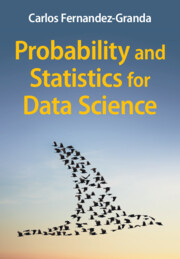
-
Select format
-
- Publisher:
- Cambridge University Press
- Publication date:
- 19 June 2025
- 03 July 2025
- ISBN:
- 9781009180108
- 9781009180085
- 9781009180092
- Dimensions:
- (254 x 178 mm)
- Weight & Pages:
- 1.426kg, 624 Pages
- Dimensions:
- (254 x 178 mm)
- Weight & Pages:
- 1.15kg, 624 Pages
You may already have access via personal or institutional login
Book description
This self-contained guide introduces two pillars of data science, probability theory, and statistics, side by side, in order to illuminate the connections between statistical techniques and the probabilistic concepts they are based on. The topics covered in the book include random variables, nonparametric and parametric models, correlation, estimation of population parameters, hypothesis testing, principal component analysis, and both linear and nonlinear methods for regression and classification. Examples throughout the book draw from real-world datasets to demonstrate concepts in practice and confront readers with fundamental challenges in data science, such as overfitting, the curse of dimensionality, and causal inference. Code in Python reproducing these examples is available on the book's website, along with videos, slides, and solutions to exercises. This accessible book is ideal for undergraduate and graduate students, data science practitioners, and others interested in the theoretical concepts underlying data science methods.
Reviews
‘Fernandez-Granda's Probability and Statistics for Data Science is a comprehensive yet approachable treatment of the fundamentals required of all aspiring Data Scientists-whether they be in academia, industry or elsewhere. The language is clear and precise, and it is one of the best-organized treatments of this material I have ever seen. With lucid examples and helpful exercises, it deserves to be the leading text for these topics among undergraduate and graduate students in this technical, fast-moving discipline. Instructors take note!’
Arthur Spirling - Princeton University
‘If you're mathematically inclined and want to master the foundations of data science in one go, this book is for you. It covers a broad range of essential modern topics - including nonparametric methods, causal inference, latent variable models, Bayesian approaches, and a thorough introduction to machine learning - all illustrated with an abundance of figures and real-world data examples. Highly recommended.’
David Rosenberg - Office of the CTO, Bloomberg
Contents
-
Introduction and Overview
pp 1-5 -
-
- You have access
- Export citation
-
-
1 - Probability
pp 6-36 -
-
- You have access
- Export citation
-
Metrics
Altmetric attention score
Full text views
Full text views help Loading metrics...
Loading metrics...
* Views captured on Cambridge Core between #date#. This data will be updated every 24 hours.
Usage data cannot currently be displayed.
Accessibility standard: Unknown
Why this information is here
This section outlines the accessibility features of this content - including support for screen readers, full keyboard navigation and high-contrast display options. This may not be relevant for you.
Accessibility Information
Accessibility compliance for the PDF of this book is currently unknown and may be updated in the future.

